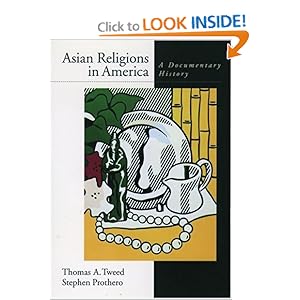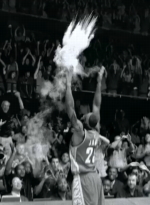Mike Altman and others here frequently have called to expanding the boundaries of the sacred for analysis, and since various contributors here have posted on everything from Disney Religion to Green Day's American Idiot to early modern tattoos, I should think this would be a receptive venue for an expansive view of religious ritual.
All the same, there's plenty of room here for traditional theological analysis. I"m going to guest post something soon from Jeremy Bangs, about the theological/social worldview of the Pilgrims, which he believes challenges much existing scholarship in the area.
In case you've been living in a cave this week, let me bring you up to speed: LeBron James has decided to sign with the Miami Heat, joining new teammates Dwayne Wade and Chris Bosh. Said act was announced in an hour-long show of absurdist theater (actually 2 hours, it seems like) last night on ESPN. Since NPR and the New York Times, Wall Street Journal, et al covered the story as well, I assume that those of you who could give a rat's behind about all this nonetheless could not escape the news story no matter how much you wanted to.
Of more interest to me is owner Gilbert's response (hilariously posted in Comic Sans font, as blog reader Matt Bowman pointed out to me), full of sound and (impotent) fury. The letter might as well have been labeled: "LeBron Shouldn't Tap."
Theologically speaking, many important lines of American religious thought crash together (Nascar style) here. Let me count the ways, or at least a few of them:
1) a critique of a culture of narcissism, with a jab at the "narcissistic, self-promotional build-up" to the televised special. Here, of course, we are into Christopher Lasch land, and I'll just point you
to this series of posts by our contributor John Fea for more there. Coming from an NBA owner, naturally this is pot calling kettle black stuff, but I'm less interested here in the evident hypocrisy than in the adoption of a pluralistic world of theological motifs.
2) "The self-declared former 'King' will be taking the 'curse' with him down south. And until he does 'right' by Cleveland, James . . . will unfortunately own this dreaded spell and bad karma."
Where to begin?? We have Ham's curse together with allusions to some sort of witchery (presumably Pat Riley is the Wizard). We have a common sense view of fairness and justice, and a defensiveness about Cleveland reminiscent of the biblical verse about what good could ever

come out of Nazareth. The end reference to karma is likely just cultural cliche, almost completely shorn now of its religious referent (similar to how the term "redemption" is commonly used -- "wow, he really redeemed himself with that putt on the 18th") -- but more charitably, I will assume owner Gilbert has read Stephen Prothero and Thomas Tweed's extensive primary source volume
Asian Religions in America, and thus speaks from a profound knowledge of the extensive influence from the nineteenth century forward of Asian religious concepts on the American psyche.
3) Weirdly juxtaposed alongside the abundant Arminian references to assured salvation and the bitterly expressed communal utopianism (guaranteeing that long-suffering Cleveland fans will enjoy the championship hardware before the false prophet LeBron ever does) is a profound aphorism of Hardshell Baptist theology:
"Some people think they should go to heaven but not have to DIE to get there."

I can hear the Appalachian preacher's end-of-line punctuation point -- "ha" -- at the end there, and the capitalization and thus verbal emphasis on DIE comes straight from many a camp meeting sermon a la Kentucky ca. 1805. But more likely, owner Gilbert got this theology via the way everyone else got it in the 1970s, from the Steve Miller Band's "Big Old Jet Airliner," with the line about having to go through hell before you get to heaven. Dante would have been singing along.
Finally, there is the emphasis from Romans 13, about all things working together for good. As Gilbert explains, "This heartless and callous action can only serve as the antidote to the so-called 'curse' on Cleveland, Ohio." Here, the false prophet has been exposed and driven out of town, and the alleged salvation that the prophet would bring can now be seen as just another sacrifice for Baal. The prophet was a conjuror, casting a spell and bringing the curse with the fetish bag of chalk powder (or whatever that white stuff was) thrown up before every game. Those fans who burned the jerseys understood that purification is the communal expiation to rid the last vestiges of the evil and witchery of the false prophet/conjuror. As the slaves sang, "Old Satan is a liar and a conjurer too, If you don't mind, he'll conjure you."
There's much, much more here, theologically speaking, and I invite comments to add to the mix. Until then, goodbye to the people I trusted. LeBron will get rich(er), for sure, but in the meantime he'll get busted.

 come out of Nazareth. The end reference to karma is likely just cultural cliche, almost completely shorn now of its religious referent (similar to how the term "redemption" is commonly used -- "wow, he really redeemed himself with that putt on the 18th") -- but more charitably, I will assume owner Gilbert has read Stephen Prothero and Thomas Tweed's extensive primary source volume Asian Religions in America, and thus speaks from a profound knowledge of the extensive influence from the nineteenth century forward of Asian religious concepts on the American psyche.
come out of Nazareth. The end reference to karma is likely just cultural cliche, almost completely shorn now of its religious referent (similar to how the term "redemption" is commonly used -- "wow, he really redeemed himself with that putt on the 18th") -- but more charitably, I will assume owner Gilbert has read Stephen Prothero and Thomas Tweed's extensive primary source volume Asian Religions in America, and thus speaks from a profound knowledge of the extensive influence from the nineteenth century forward of Asian religious concepts on the American psyche.  I can hear the Appalachian preacher's end-of-line punctuation point -- "ha" -- at the end there, and the capitalization and thus verbal emphasis on DIE comes straight from many a camp meeting sermon a la Kentucky ca. 1805. But more likely, owner Gilbert got this theology via the way everyone else got it in the 1970s, from the Steve Miller Band's "Big Old Jet Airliner," with the line about having to go through hell before you get to heaven. Dante would have been singing along.
I can hear the Appalachian preacher's end-of-line punctuation point -- "ha" -- at the end there, and the capitalization and thus verbal emphasis on DIE comes straight from many a camp meeting sermon a la Kentucky ca. 1805. But more likely, owner Gilbert got this theology via the way everyone else got it in the 1970s, from the Steve Miller Band's "Big Old Jet Airliner," with the line about having to go through hell before you get to heaven. Dante would have been singing along. 





